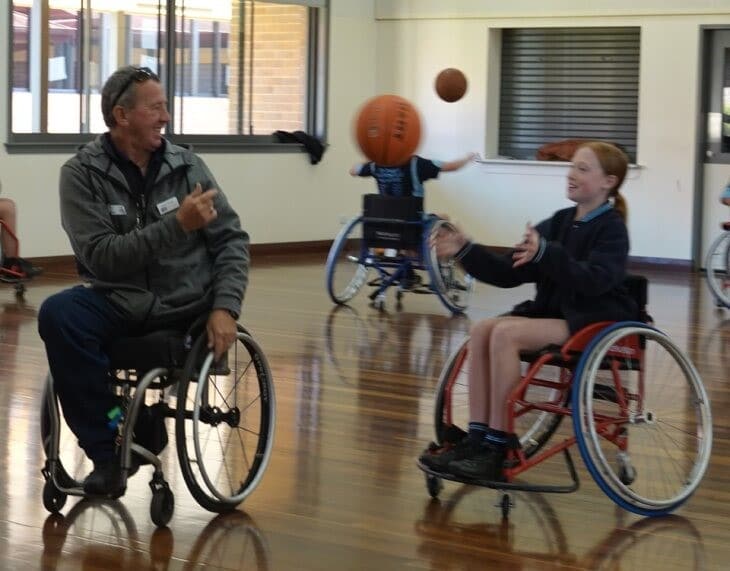
School children in the Dubbo region had the chance to try wheelchair ball sports and learn about Aboriginal perspectives on inclusion and disability, when a former Paralympian and a Ngemba man visited in late October. Champion wheelchair tennis player David Johnson and Ngemba man, Richard Clarke are both employed by Social Futures, an NDIS partner in the community. They were in Dubbo and surrounding areas from October 31 to November 2.
Children in Dubbo schools had the chance to try wheelchair ball sports and learn about Aboriginal perspectives on inclusion and disability when a former Paralympian and a Ngemba man visited in late October.
Champion wheelchair tennis player David Johnson and Ngemba man, Richard Clarke are both employed by Social Futures, an NDIS partner in the community.
They regularly visit schools in New South Wales with their innovative programs and were in Dubbo and surrounding areas from October 31 to November 2.
The Sports Ability Program
David, who won a Silver medal in the Sydney 2000 Paralympics, taught wheelchair sports to school children.
“Trying sport in a wheelchair gives students a whole new perspective around disability and inclusion and it’s also lots of fun to move at speed on wheels and direct a ball,” Mr Johnson said.
“I’d describe this Sports Ability program as a good hands-on learning experience for kids, it’s something they’ve never previously had the chance to do.
“Kids get really engaged, and I love it, and they want more time doing the sports. They’re really open to the idea – and they get comfortable around people with disabilities. I make it fun and we talk lots about accessibility and inclusion for people with all types of disabilities.”
Mr Johnson lost a leg in a car accident when he was a teenager and went on to represent Australia in the men’s open singles and doubles wheelchair tennis in the Sydney 2000 Paralympics.
He said that before students get into the wheelchair, he talks to them about their understanding of disability, inclusion and the benefits for people with a disability when they enjoy and play sport.
“I break it down for them and show them how they can play their part in building an accessible and inclusive community that welcomes everyone,” he said.
“Over the past three years I have run over 1000 sessions at schools with over 10,000 students getting the chance to try wheelchair sports.”
“I cover basic wheelchair skills, and also go over different types of wheelchairs then I begin with basic stuff, like moving in a straight line. Next we move to manoeuvring around cones, and I remind the students that people in wheelchairs have to learn how to avoid feet or dogs paws – you just can’t run them over, people! ”
Students and teachers provide feedback after the program – a past comment from a teacher was, “I liked that a couple of the students happily spoke about their disabilities during the session. Afterwards, students and staff discussed access issues to the bathrooms in our school which we hadn’t observed before. At lunchtime afterwards, I noticed the school yard conversation was all about disability and wheelchairs, also identifying barriers in school grounds.”
The Milkiri Inclusion in Culture program
The Milkiri Inclusion in Culture program was designed by local area coordinator Richard Clarke, a proud Ngemba man from Brewarrina in North Western NSW.
Richard says when he goes to schools, he explains five key perspectives of disability from his culture: everybody is different; difference is an important part of how we live; everybody has a role to play; we take care of each other; and staying connected to mind, body, spirit and Country helps keep us strong.
Richard’s grandfather used a wheelchair. This did not stop him from playing a vital role teaching Richard and others about culture, Country, stories and bush foods.
“That’s the message I emphasise in schools – we may be different, but everyone is still valued, has role and is needed by their community,” Richard said.
The name Milkiri is a Ngemba word meaning ‘ant dance’ and it was given to Richard by his Uncle Roy to use when teaching about culture. Richard explores ideas around disability and difference through dances, demonstration, songs, and storytelling. He also introduces students to Aboriginal tools and artifacts, including explaining the importance of the digeridoo.
“I engage students through culture, and after the Acknowledgement of Country, I ask them to think about where they come from, where they are connected to and who their mob is,” he said.
Since creating Milkiri, Richard has visited more than 30 schools and met with more than 700 students. The children have given the program glowing reviews.
One student told ‘Uncle Richard’ that he now understood it was okay not be the same as everyone else.
“I always leave schools with a sense of pride because the students have learnt something from me, and I also get to see the Aboriginal students step up and share their culture with their class peers.
“I witness them explaining, ‘This is how you do that’ and then I again feel so proud. I thank those students for sharing.”
“I am grateful to have this opportunity to share my culture and demonstrate how it is so inclusive,” he said.
PHOTO: David Johnson in action at a NSW school.